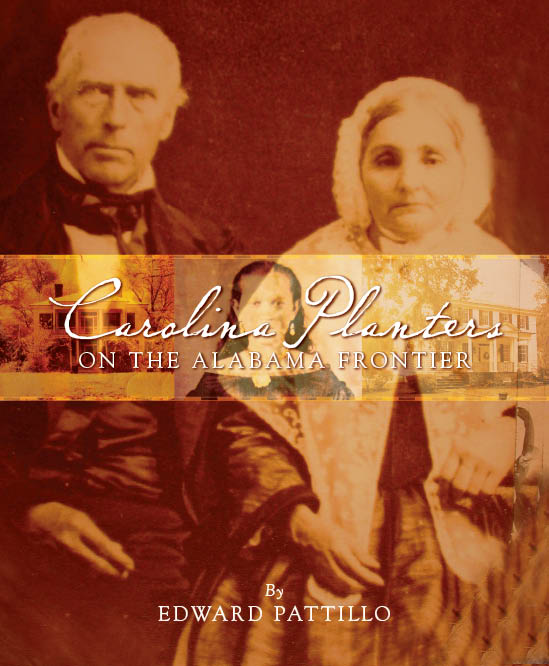 A detailed interview and a glowing review are just the latest to spotlight Eddie Pattillo’s unique book of history, Carolina Planters on the Alabama Frontier. Here, Pattillo, an Alabama historian, reproduces his ancestors’ letters from the seventeenth through nineteenth centuries, painstakingly collected alongside Pattillo’s own copious research, to give an unprecedented glimpse of early American life.
A detailed interview and a glowing review are just the latest to spotlight Eddie Pattillo’s unique book of history, Carolina Planters on the Alabama Frontier. Here, Pattillo, an Alabama historian, reproduces his ancestors’ letters from the seventeenth through nineteenth centuries, painstakingly collected alongside Pattillo’s own copious research, to give an unprecedented glimpse of early American life.
Writer John Sledge of the Mobile Press-Register called Carolina Planters “magnificent” in a review in his “Southern Bound” column. Sledge raves that the letters from the Spencer, McKenzie, and Roberson family in the book are “so beautifully expressive in their writings and so immersed in the issues of their day that their story is not only entertaining and instructive, but nothing less than a history of the antebellum South in genealogical microcosm.
“The book is further strengthened by Pattillo’s considerable skills as a historian and gifted prose style. I cannot emphasize this last point strongly enough. Pattillo writes so well and so gracefully and weaves in his documentary selections — letters, wills, diaries, photographs, property inventories — so seamlessly that the book is pure pleasure to anyone who loves the past.”
Pattillo discussed the book himself recently on the Walter Edgar’s Journal show on South Carolina’s ETV radio. Pattillo grew up hearing how his ancestors had come to Alabama from South Carolina; in 1850, Edgar notes, half of white individuals in US census who listed South Carolina as their birthplace lived elsewhere, part of the country’s western expansion in the nineteenth century. When Pattillo graduated high school, he travelled to South Carolina to research family history. and there found the family letters that form the basis of Carolina Planters.
In the interview, Edgar and Pattillo discuss that while the families in the book were privileged and had a great deal of money and furnishings, they were often starting from scratch when they moved to new, burgeoning territories. Pattillo described it as “country where no white people had ever lived before. and they were literally creating plantations and a civilization, they hoped, out of the wilderness. It was rich land, but they had to do everything; they had to clear the land, cut down the trees, build log cabins at the very outset and so forth.”
Not only were the settlers unused to the work, but disease was rampant. “In heartbreaking letters,” Pattillo explains, they lost their children “constantly.”
Among his favorite ancestors, Pattillo tells Edgar, is Confederate General James Holt Clanton, whom Pattillo describes as a “hothead” that “kept making the higher ranking generals upset because he was always dashing off and doing things he wasn’t supposed to do.” After the Civil War, Clanton became a politician, but was shot on the street by a former Union soldier; ten thousand people followed Clanton’s funeral procession, the first state funeral in Alabama history. Clanton was, Pattillo says, a “rash but very romantic figure.”
In Carolina Planters and in the interview, Pattillo is quick to note his ancestors’ ownership of slaves and the role that slaves played in settling the new territories. Sledge praises Pattillo for the same; “conscientious historian that he is,” Sledge writes, “Pattillo does what he can to tease out the less-celebrated and often difficult story of the family’s slaves … Where and when he can, he includes ‘every scrap’ about the slaves that he can find, ‘not only in an attempt to give back to them some of their own lost history, but also in hope that their descendants might find clues to their ancestry here.'”
Sledge concludes that “Carolina Planters on the Alabama Frontier is a thoroughly grounded labor of love that manages to be unblinking in both its admiration and its criticism. This is no mean accomplishment, and an object lesson in how to be at once both proud and realistic about one’s Southern heritage.”
Read John Sledge’s “Southern Bound” column at the al.com website. You can also download Eddie Pattillo’s interview with Walter Edgar at the Walter Edgar’s Journal website.
Carolina Planters on the Alabama Frontier is available direct from NewSouth Books, Amazon.com, or your favorite bookstore.
